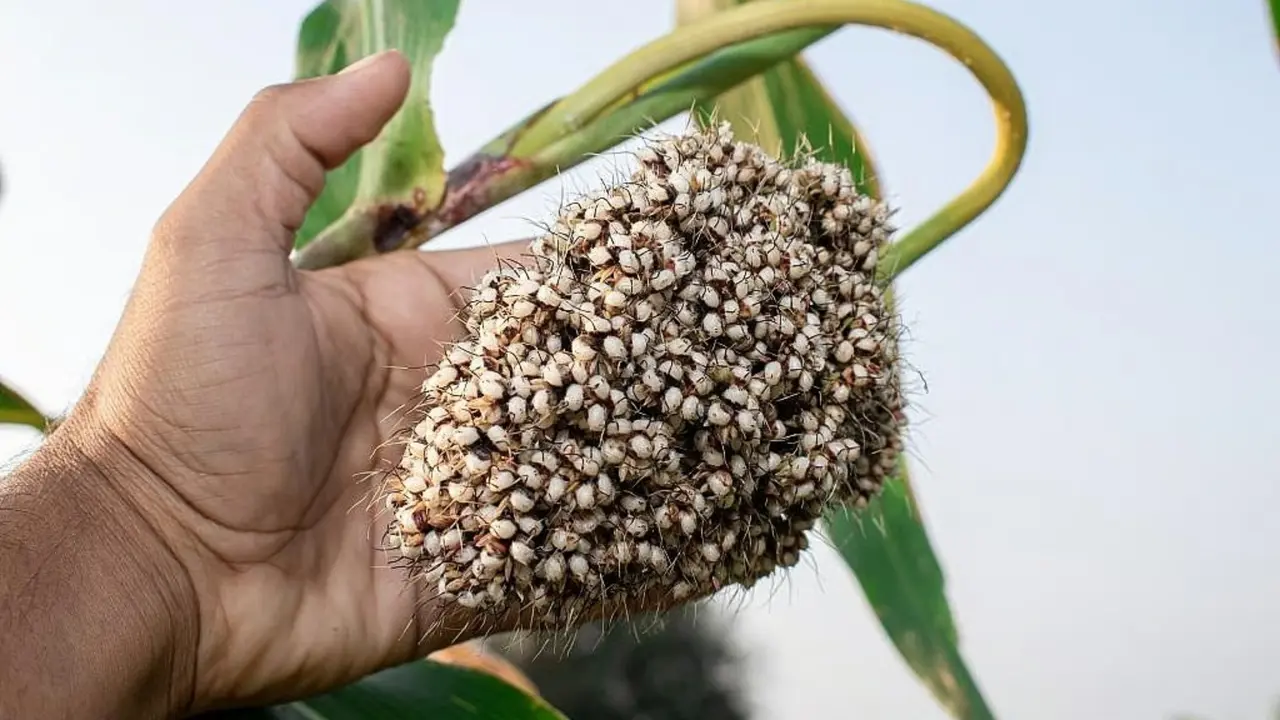Updated 29 May 2025 at 14:15 IST
Why Jowar Is a Superfood: 8 Health Benefits Explained
Jowar is gaining popularity as a nutrient-packed superfood. Learn about its top 8 health benefits, from aiding digestion to managing diabetes and weight.
- Lifestyle News
- 4 min read

Jowar, also known as sorghum, is a gluten-free whole grain that has been part of traditional diets for over 5,000 years. It belongs to the millet family and is widely cultivated in India, Africa, Australia, and Central America. With its rich nutritional profile, jowar is now gaining popularity as a healthy alternative to refined flours like maida (all-purpose flour) and wheat.
Jowar is clad by several names such as durra, Egyptian millet, great millet, kafir corn, feterita, guinea corn, Sudan grass, milo, Juwar, Jwari in Marathi, Cholam in Tamil, Jolal in Kannada and Jonnalu in Telugu.
Jowar is becoming popular these days, especially among fitness lovers, as a healthy alternative to wheat. It can be eaten as whole grain or made into flour. Jowar flour is smooth and soft, like oatmeal, but lighter than wheat. Pancakes and baked dishes made from jowar are light, fluffy, and tasty. Because of its natural sweetness, jowar is also used to make alcoholic drinks.
Why Is Jowar a Superfood?
Jowar is packed with essential nutrients like protein, carbohydrates, and dietary fibre, which promote growth and development. It is an ideal cereal for weight watchers and also helps regulate diabetes. Rich in calcium, iron, phosphorus, potassium, and sodium, these minerals fortify the bones, strengthen immunity, and help keep diseases at bay. In addition, jowar contains a notable amount of vitamins such as thiamine, niacin, folate, and riboflavin, which are known to boost overall health.
Advertisement
8 Health Benefits of Jowar You Should Know
1. Supports Healthy Digestion
Jowar is rich in dietary fiber, which helps regulate bowel movements, reduces bloating, and supports a healthy gut. Just one serving can meet almost 48% of your daily fiber needs.
2. Aids in Weight Loss
Trying to lose weight? Jowar keeps you full for longer, reduces hunger pangs, and helps curb unnecessary snacking. It’s also low in fat and a great addition to weight management diets.
Advertisement
3. Regulates Blood Sugar Levels
Jowar has a low to moderate glycemic index, which means it releases sugar slowly into the bloodstream. This helps prevent sugar spikes and supports better blood sugar control perfect for diabetics.
4. Boosts Heart Health
Jowar is rich in antioxidants and plant compounds like phenols and tannins that help lower bad cholesterol (LDL), improve blood circulation, and reduce the risk of heart disease and stroke.
5. Strengthens Bones
Loaded with calcium, magnesium, and phosphorus, jowar helps in maintaining bone density, strengthens bones, and reduces the risk of conditions like osteoporosis and arthritis.
6. Enhances Energy Levels
Jowar is a great source of complex carbohydrates and vitamin B3 (niacin), which help convert food into energy. It keeps you energized and focused throughout the day.
7. Improves Hemoglobin & Blood Circulation
Thanks to its high iron and copper content, jowar promotes the production of red blood cells, boosts hemoglobin levels, and improves overall blood circulation—essential for healthy skin and hair too.
8. Good for Skin Health
The nutrients in jowar like niacin, antioxidants, iron, and magnesium nourish your skin from within. You can even use jowar flour in DIY face packs to hydrate and brighten your skin naturally.
Nutrition Facts | Amount (per 100g) |
Calories | 329 |
Total Fat | 3.5g |
Saturated Fat | 0.6g |
Total Carbohydrate | 72g |
Dietary Fiber | 6.7g |
Sugar | 2.5g |
Protein | 11g |
Calcium | 13.00mg |
Iron | 3.36mg |
Potassium | 363mg |
Sodium | 2mg |
Thiamine | 0.35mg |
Riboflavin | 0.14mg |
Niacin | 2.1mg |
Folate | 39.42mg |
(Source As Per The USDA)
Jowar vs. Bajra: Which Is Better?
Both jowar (white millet) and bajra (pearl millet) are nutritious, gluten-free grains. While jowar is lighter and slightly sweeter, bajra is heavier and packed with more fiber. You can include both in your diet for variety and balanced nutrition.
How to Add Jowar to Your Diet?
You can enjoy jowar in many forms:
Jowar roti (flatbread
Porridge with milk and waterJowar flour pancakes
Baked goods like muffins, cookies, and breads
Traditional dishes like upma, dosa, or couscous
Ayurvedic Uses of Jowar
In Ayurveda, jowar is considered to have madhura (sweet) and kashaya (astringent) tastes. It is laghu (light to digest) and possesses Sheeta Virya (cooling energy). These properties make it effective in balancing Vata and Kapha doshas.
Jowar is rich in iron, calcium, potassium, phosphorus, and powerful phytochemicals. These nutrients not only support overall health but also help in:
Weight management
Improved digestion
Heart health
Detoxification
Published By : Navya Dubey
Published On: 29 May 2025 at 13:47 IST
